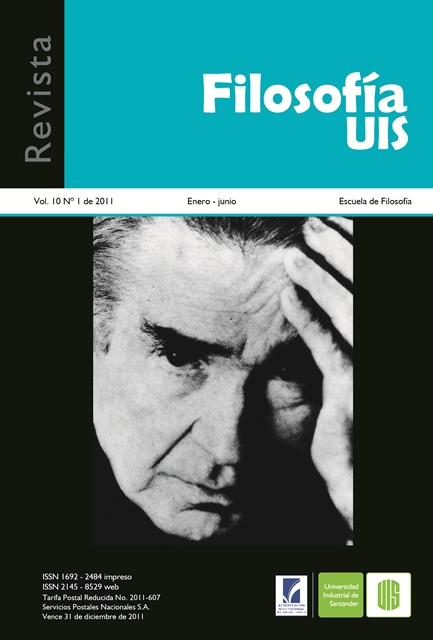Publicado 2011-07-15
Palavras-chave
- lógica,
- ética,
- valor,
- psicología,
- fenomenología
- epoché,
- eudaimonía ...Mais
Como Citar
Copyright (c) 2011 Susi Ferrarello

Este trabalho está licenciado sob uma licença Creative Commons Attribution 4.0 International License.
Resumo
Pensar, actuar y ser son actividades cruciales de nuestra vida diaria. Estas actividades implican un trabajo práctico y epistemológico, base de la comprensión de las nuestras elecciones. En primer término se presentarán las generalidades sobre el pensamiento, los valores, y las normas morales como expresión de los valores personales. En segundo lugar, se explicarán los límites de la lógica, la ética y la psicología en la expresión de la identidad individual. En particular, me pregunto si hay una paradoja en la filosofía moral. En efecto, nosotros aprendemos la máxima délfica bien presente en el pensamiento de Sócrates –“γνῶθι σεαυτόν” (“Conócete a ti mismo”)– pero no podemos siempre toda nuestra identidad. Por tanto, el objetivo de este trabajo es investigar esta máxima y su significación lógica, psicológica y moral.
Downloads
Referências
- Bernet, Rudolf; Kern, Iso & Marbach, Eduard (1993). Introduction to Husserlian Phenomenology, Evanston: Northwestern University Press.
- Baumann, Zygmut (2004). Identity, Cambridge: Cambridge University Press.
- Donoe, Janet (2004). Husserl on Ethics and Intersubjectivity. From Static to Genetic Phenomenology, Amherst: Humanity Books.
- Descartes, René (1993). Meditations on First Philosophy, ed. by Charles Taylor, London: Routledge.
- Flanagan, Owen & Rorty, Amélie (1997). Identity, Character and Morality, Cambridge: MIT.
- Husserl, Edmund (1987). Aufsätze und Vorträge (1911-1921), ed. by Thomas Nenon und Hans Rainer Sepp, The Hague: Kluwer Academic Publishers.
- Husserl, Edmund (2004). Einleitung in die Ethik 1920 – 1924, ed. by Hennig Peucker, Dordrecht/Boston/London: Kluwer Academic Publishers.
- Husserl, Edmund (2002). Einleitung in die Philosophie. Vorlesungen 1922/23, hrsg. von Berndt Goossens. Dordrecht, Netherlands: Kluwer Academic Publishers.
- Husserl, Edmund (1988). Vorlesungen über Ethik und Wertlehre, 1908 - 1914, ed. by Ulrich Melle, The Hague, Netherlands: Kluwer Academic Publishers.
- Macintyre, Alasdair (1984). After Virtue, Oxford: Oxford University Press.
- Melle, Ulrich (1991). “The Development of Husserl’s Ethics”, In: Etudes Phénoménologiques, 13-14, pp. 115-135.
- Melle, Ulrich (1988). “Einleitung des Herausgebers”, In: Hua. 28, The Hague, Netherlands: Kluwer Academic Publishers.
- Parfit, Derek (1984). Reasons and Persons, Oxford: Oxford University Press.
- Peucker, Hennig (2008). “From Logic to Person: an Introduction to Edmund Husserl”, In: Review of Metaphysics, XII, pp. 307-325.
- Rorty, Amélie (1969). The Identities of Persons, Berkley and Los Angeles: University of California Press.
- Sandel, Michael (1982). Liberalism and the Limits of Justice, London: Cambridge University Press.
- Taylor, Charles (1976). “Responsibility for Self”, In: Oksenberg Rorty, A. (ed.), The Identities of Persons, Berkley and Los Angeles: University of California Press, 1969, pp. 281-299.
- Taylor, Charles (1985). Human agency and language: Philosophical papers volumen 1, Cambridge: Cambridge University Press.
- Similansky, Saul (2007). 10 Moral Paradoxes, Oxford: Blackwell Publishing.
